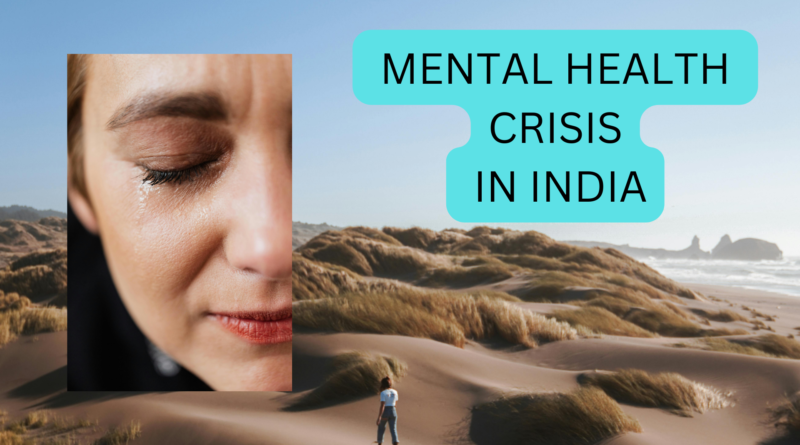The Most Dangerous Mental Health Crisis Among Indians
Introduction
As a practising physician in India, I am increasingly seeing young individuals with many health issues – mainly mental health. It may be their lifestyle, the post-pandemic effect, or the expectation of achieving more in their career growth.
But all of this is taking a toll on their mental health and making them more anxious. I see them coming to my clinic with mental issues.
The biggest problem in Indian families is the attitude to dismiss the fact that someone may have anxiety or tension. The most common statement from family members is why they think so negatively or “ Tension kyu lene ka.”
The COVID-19 pandemic has left an indelible mark on our lives, but beyond the physical health challenges, it has also triggered a mental health crisis. The isolation, economic uncertainties, and sheer unpredictability of the situation have taken a toll on mental well-being, particularly in India, where cultural factors such as familial responsibilities and societal expectations can further exacerbate these challenges. Let’s delve into the mental health issues faced by Indian adults post-COVID and explore ways to address and manage these challenges.
Understanding Mental Health Issues
Definition and Types of Mental Health Disorders
Mental health encompasses our emotional, psychological, and social well-being. It influences how we think, feel, and act. Common mental health disorders include anxiety, depression, bipolar disorder, and schizophrenia, each affecting individuals differently.
Common Symptoms and Signs
Mental health disorders manifest in various ways. Common symptoms include persistent sadness, excessive worry, mood swings, withdrawal from social activities, and changes in sleep or appetite. Recognising these signs early and seeking timely intervention is crucial for effective management of mental health issues. Many of them come to the clinic with hyperventilation, severe breathlessness, or severe weakness, which is sudden onset, and they get very anxious that they have some significant health issues with fear of death.
Impact of COVID-19 on Mental Health in India
According to a survey by the Indian Psychiatry Society, there was a [10-fold] increase in mental health cases during the lockdown. This rise underscores the urgent need for mental health services and support.
Personal Stories: The Human Side of the Statistics
Behind every statistic is a human story. Take Rina, a young professional who lost her job during the pandemic. The ensuing financial strain and isolation led to severe anxiety. Stories like Rina’s and [another personal story] illustrate the profound impact of the pandemic on mental health.
Specific Mental Health Challenges Faced by Indian Adults
Anxiety and Panic Disorders
The uncertainty of the pandemic has exacerbated anxiety and panic disorders. Fear of infection, worries about loved ones, and financial instability have heightened anxiety levels.
Depression and Mood Disorders
Isolation and the lack of normalcy have fueled depression. Feelings of hopelessness and despair are common as people grapple with prolonged life disruptions.
Stress and Burnout
The blurred lines between work and home life have led to increased stress and burnout. The constant need to adapt to new norms has left many feeling overwhelmed.
Social Isolation and Loneliness
Lockdowns and social distancing have intensified feelings of loneliness. The lack of physical interaction has particularly affected those living alone or away from family.
Grief and Loss
The pandemic has brought about unprecedented loss. The grief of losing loved ones, combined with the inability to perform traditional mourning rituals, has compounded emotional distress.
Factors Contributing to Mental Health Issues Post-COVID
Economic Uncertainty and Job Loss
The economic fallout from the pandemic has led to job losses and financial instability, major stressors contributing to mental health issues.
Health Concerns and Fear of Infection
Ongoing fear of COVID-19 infection continues to cause anxiety. Concerns about one’s health and that of loved ones remain prevalent.
Changes in Lifestyle and Routine
The abrupt changes in daily routines have disrupted our sense of normalcy, contributing to stress and anxiety.
Lack of Social Interaction
Humans are social beings, and the lack of interaction has led to feelings of isolation and loneliness.
Coping Strategies and Solutions
Seeking Professional Help
I’d like you all to be open to suggestions when they come from a doctor. Do not think that we are dismissing your problem.
Psychologists, Psychiatrists, and Therapists
Professional help is crucial for managing mental health issues. Psychologists, psychiatrists, and therapists can provide the necessary support and treatment.
Online Therapy and Helplines
With technological advancements, online therapy and helplines have become accessible, providing immediate support to those in need. Here, it can be done anonymously. So, the social taboo of going to a “mental doctor” is removed from the equation.
Building a Support System
Family, Friends, and Community Support
A strong support system is invaluable. In India, we have a rich tradition of relying on family, friends, and community groups for emotional support and encouragement. This traditional support system can play a significant role in coping with mental health issues. But when it comes to support for mental health problems, they are not there to help. They also need to learn how to show empathy.
Self-Care Practices
I generally use the phrase, “We all are mentally impaired”.
If you wonder why I say this, it’s just because it’s true for all professions; even doctors are also mentally exhausted these days.
We don’t take care of our mental health. Everyone goes to the gym, for a walk or does some physical activity to be healthy, but people neglect their mind to relax daily, and we don’t have any way or instrument to do this.
“What do you do daily to relax or something for your mental health?”
“Nothing much!” Everyone says they do physical activity or refer to screen time on social media, TV, or a web series. Which eventually increases their stress. People don’t realise this.
“Stress or pressure or tension ” is a motivator (as I see it).
How?
If we are not motivated, how will we go to school, study for exams, meet our deadlines, go to the office, work for money, and so on?
But when we don’t relax, the pressure of doing things becomes malignant, and problems start.
AS WE DO NOT HAVE ANY COMPING MECHANISM
Mindfulness and Meditation
Mindfulness and meditation can significantly reduce stress and anxiety. These practices help ground individuals and promote mental well-being.
Physical Exercise and Healthy Eating
Physical activity and a balanced diet are crucial in maintaining mental health. Exercise releases endorphins, while healthy eating provides the necessary nutrients for brain function.
Creating a Routine and Setting Goals
Establishing a daily routine and setting achievable goals can restore a sense of normalcy and purpose and help manage stress.
Government and Community Initiatives
Government Policies and Programs
The Indian government has initiated several mental health programs and policies to address this crisis. Numerous NGOs and community groups have stepped up to provide mental health support, offering anonymous support services to those in need.
Community Support Groups and NGOs
Numerous NGOs and community groups, along with the Indian government, have stepped up to provide mental health support. They offer counselling and other resources to those in need, demonstrating a strong support system.
The Role of Technology in Mental Health
Mental Health Apps and Online Resources
Mental health apps and online resources offer convenient access to support and information and effective tools for managing mental health. These resources empower individuals to take control of their mental well-being.
Telemedicine and Virtual Counseling
Telemedicine and virtual counselling have made mental health services more accessible, allowing individuals to seek help from the comfort of their homes. Telemedicine is the remote delivery of healthcare services via telecommunications technology, including mental health consultations. Virtual counselling, on the other hand, is a form of therapy conducted online, typically through video calls or chat platforms.
Importance of Awareness and Education
Breaking the Stigma Around Mental Health
Addressing mental health openly and breaking the associated stigma is crucial. Encouraging conversations about mental health can foster a supportive environment.
Educating the Public on Mental Health Issues
Public education initiatives can help people understand mental health issues better, promoting empathy and support for those affected.
Conclusion
The mental health challenges faced by Indian adults post-COVID are significant but not insurmountable.
First, acknowledge that you have a problem. Then, ask for help and be ready to help others.
Remember, mental health is as important as physical health, and addressing it requires a holistic approach. I encourage you to [specific call to action, such as ‘start a conversation about mental health ‘, ‘seek professional help if needed ‘, or ‘support a loved one who may be struggling with their mental health ‘]. Together, we can make a difference.
FAQs
What are the most common mental health issues post-COVID?
Anxiety, depression, stress, and burnout are among the most common mental health issues faced by individuals post-COVID.
How can I support a loved one with mental health issues?
Listen without judgment, encourage them to seek professional help, and offer emotional support. Being present and understanding can make a significant difference.
What are some effective self-care practices?
Mindfulness, meditation, physical exercise, and a healthy diet are effective self-care practices. Establishing a routine and setting achievable goals can also help.
Are there any reliable online resources for mental health support?
Many reliable online resources and mental health apps provide information, support, and virtual counselling services. Examples include BetterHelp, Talkspace, and Headspace.
How can we reduce the stigma around mental health in India?
Open conversations, education, and awareness campaigns can help reduce the stigma around mental health. Encouraging empathy and understanding is vital.





